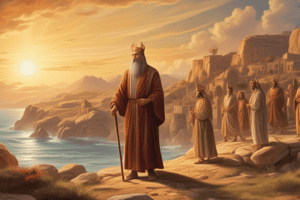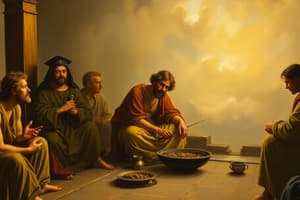Podcast
Questions and Answers
What historical event is considered the mid-point of time in Christianity?
What historical event is considered the mid-point of time in Christianity?
- The coming of Jesus (correct)
- The crucifixion of Jesus
- The return of Jesus
- The creation of the world
Which emperor is noted for being the first to publicly recognize Christianity as a different religion?
Which emperor is noted for being the first to publicly recognize Christianity as a different religion?
- Tiberius
- Caligula
- Nero (correct)
- Augustus
How did the early Roman perception of Christians differ from that of Jewish leaders?
How did the early Roman perception of Christians differ from that of Jewish leaders?
- Christians were seen as a Jewish sect by Romans. (correct)
- Christians were accepted as prominent leaders.
- Christians were thought to be followers of Rome.
- Christians held no significant place in society.
What was one reason Christianity became unpopular in the Roman Empire?
What was one reason Christianity became unpopular in the Roman Empire?
What action taken by Paul during his missionary journeys contributed to the spread of Christianity?
What action taken by Paul during his missionary journeys contributed to the spread of Christianity?
What was the fate of the apostle Peter during Nero's persecution of Christians?
What was the fate of the apostle Peter during Nero's persecution of Christians?
In what city were believers first referred to as Christians?
In what city were believers first referred to as Christians?
What event caused significant damage to Rome around AD 64?
What event caused significant damage to Rome around AD 64?
What did Christians do that challenged the conventional social structures of Roman society?
What did Christians do that challenged the conventional social structures of Roman society?
Why did Romans tolerate the Jewish belief in one God?
Why did Romans tolerate the Jewish belief in one God?
What was the major consequence of Florus's actions in Judea?
What was the major consequence of Florus's actions in Judea?
How did Vespasian's position change after Emperor Nero's suicide?
How did Vespasian's position change after Emperor Nero's suicide?
What event occurred on August 5, AD 70?
What event occurred on August 5, AD 70?
What choice did Jewish defenders at Masada prefer over surrender?
What choice did Jewish defenders at Masada prefer over surrender?
Which of the following reflects the attitude of the Romans towards new products?
Which of the following reflects the attitude of the Romans towards new products?
Flashcards
Christianity's historical roots
Christianity's historical roots
Christianity is based on historical events and records, with the Bible as a primary source.
Early Christian view by Romans
Early Christian view by Romans
Initially, Romans saw Christians as a Jewish sect.
Christianity's separation from Judaism
Christianity's separation from Judaism
By 100 AD, Christianity had become distinct from Judaism, often facing exclusion and persecution.
Paul's missionary journeys
Paul's missionary journeys
Signup and view all the flashcards
Christian persecution by Nero
Christian persecution by Nero
Signup and view all the flashcards
Christian's unpopularity in Rome
Christian's unpopularity in Rome
Signup and view all the flashcards
Roman society's preference for established practices
Roman society's preference for established practices
Signup and view all the flashcards
Jewish Rebellion
Jewish Rebellion
Signup and view all the flashcards
Destruction of Jerusalem
Destruction of Jerusalem
Signup and view all the flashcards
Masada
Masada
Signup and view all the flashcards
The Wailing Wall
The Wailing Wall
Signup and view all the flashcards
The Great Fire of Rome
The Great Fire of Rome
Signup and view all the flashcards
Emperor Nero and Christians
Emperor Nero and Christians
Signup and view all the flashcards
Roman acceptance of Jewish faith
Roman acceptance of Jewish faith
Signup and view all the flashcards
Study Notes
Christianity and History
- Christianity is a historical religion rooted in historical events and records.
- The Bible is considered a primary historical document.
- The belief in the incarnation signifies God's entry into human history.
- Christian history highlights the faithfulness of martyrs, God's faithfulness, past theological errors, and a shared heritage.
- History provides a link between the past, present, and future in Christianity.
Early Christianity and its Separation from Judaism
- Initially, Christians were viewed as a Jewish sect by Romans.
- Jewish leaders considered Christians as renegades who abandoned Jewish faith.
- By 100 AD, Christianity became distinct from Judaism.
- Jewish synagogues excluded Christians, and the Roman empire persecuted them.
- Paul’s missionary journeys spread Christianity across Asia Minor and the Western Roman Empire.
- The term "Christian" originated in Antioch, Turkey.
Roman Persecution of Christians
- The Great Fire of Rome in AD 64 led to widespread persecution of Christians under Emperor Nero.
- Nero's motives for persecuting Christians were fueled by rumors of his involvement in starting the fire and a desire to rebuild Rome according to his vision.
- Peter, an apostle, was martyred in Rome during Nero's persecution.
- Paul, another apostle, also faced persecution and died by the sword.
Reasons for Christianity's Unpopularity
- Christians' monotheistic belief was perceived as arrogant by Romans who worshipped multiple gods.
- Christianity challenged the Roman social order by welcoming the lower classes and valuing all lives equally.
- Christians defied social structures by accepting unwanted infants, welcoming slaves, and treating women as equal inheritors of God's grace.
Christianity and Roman Society
- Ancient Romans valued old, established practices over new ideas.
- The Jewish faith, rooted in Abraham's encounter with God thousands of years before Rome's founding, was tolerated for its antiquity.
- However, despite its antiquity, the Jewish people received little respect from Romans.
The Jewish Rebellion and Fall of Jerusalem
- Roman governor Florus's mistreatment of Jews in AD 64 sparked a rebellion.
- The rebellion led to the death of 3,600 Jews.
- Emperor Nero ordered the Roman general Vespasian to quell the rebellion and reclaim Judea and Galilee.
- Following Nero's suicide, Vespasian seized the throne and later sent an army to besiege Jerusalem.
- Jerusalem fell to the Romans on August 5, AD 70.
- The destruction of Jerusalem included the temple, with a remnant wall known as the "Wailing Wall" remaining.
- Jewish rebels ultimately faced defeat, culminating in a mass suicide at the fortress of Masada near the Dead Sea rather than surrendering to the Romans.
Studying That Suits You
Use AI to generate personalized quizzes and flashcards to suit your learning preferences.




